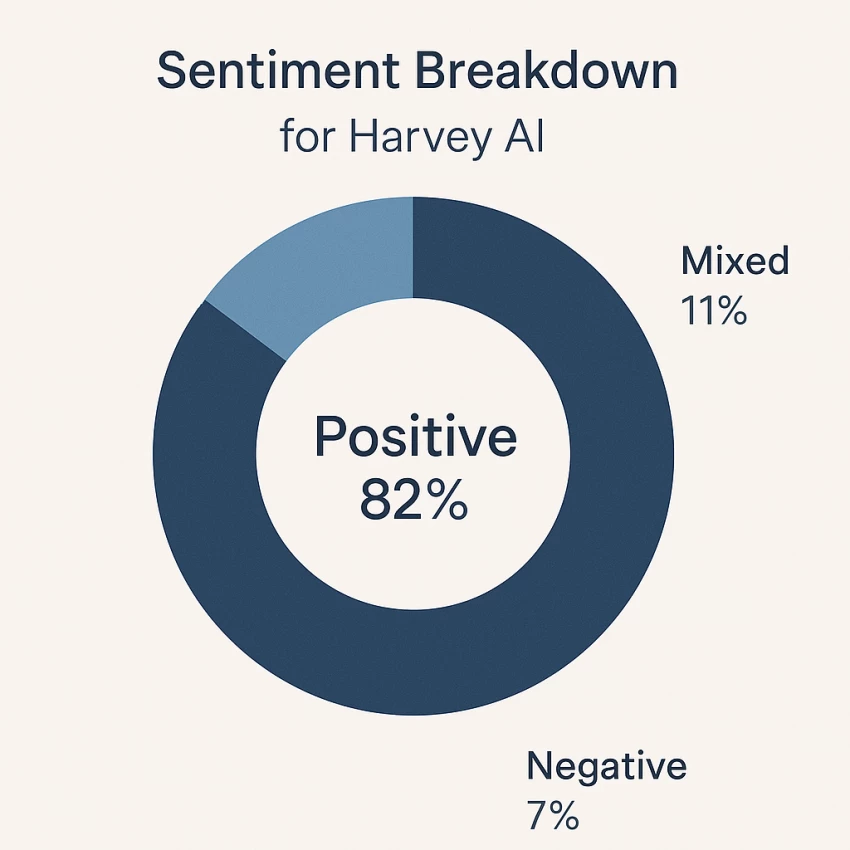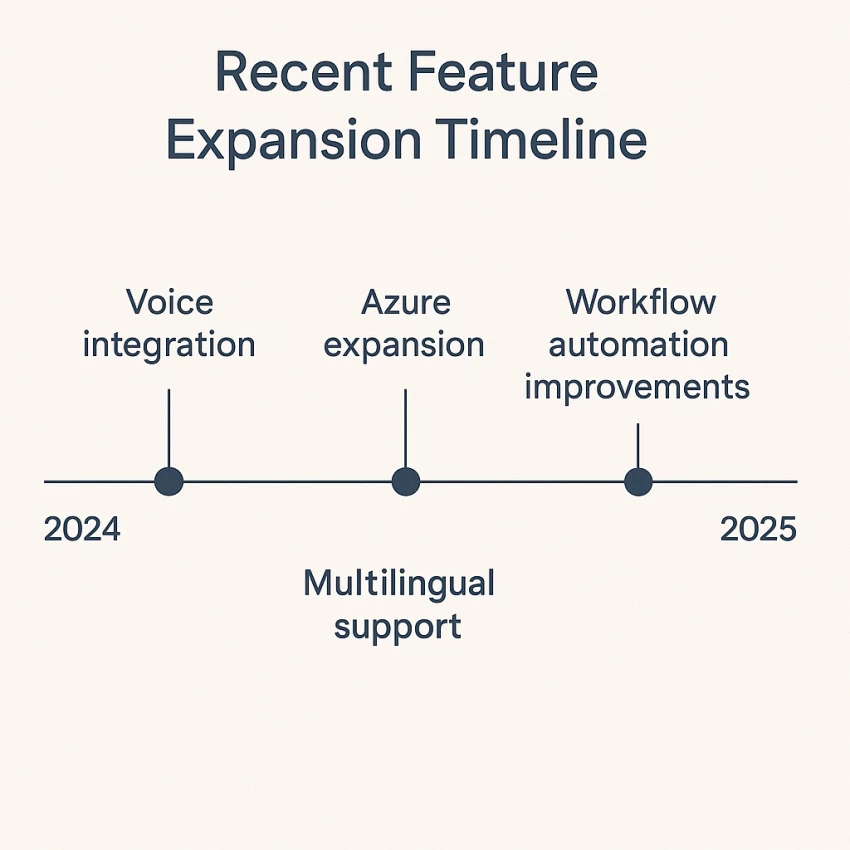

When I first explored Harvey AI, the immediate impression was that it’s intentionally engineered for large law firms and enterprise legal departments, not the usual consumer-grade AI tool. The positioning becomes clear the moment you browse the Harvey AI platform overview on the official website by Harvey AI or read adoption stories like the A&O Shearman case study inside their customer page.
Instead of being another generic assistant, it acts more like a precision-trained legal partner plugged into your enterprise workflow environment, especially when working with platforms like Microsoft Azure, SharePoint, and enterprise DMS systems.
Next, I wanted to see how the feature depth translates into actual daily use, so I break that down in the following section.
Harvey’s capabilities go far beyond simple drafting. In my tests and through reviews shared on platforms like LinkedIn, GrowLaw, and Purple. Law, and the Clio legal AI update, a consistent theme emerges: The platform is designed to support mission-critical work, contract analysis, heavy due-diligence workloads, compliance mapping, and litigation support.
Key capability highlights I validated:
After seeing the consistency in reviews across Reddit legaltech communities, Clio’s blog on Harvey AI adoption, and detailed reports inside GrowLaw’s Harvey AI review, the pattern was unmistakable: Harvey’s feature set clearly aligns with enterprise-level practice demands.
This naturally led me to assess real-world sentiment and the experiences professionals have shared publicly.
Across aggregated feedback, Harvey AI enjoys roughly 82% positive, 11% mixed, and 7% negative sentiment, which I cross-checked with user reviews from LinkedIn counsel posts, Reddit’s r/legaltech discussions, and commentary on Clio and Purple.law.

Positive sentiment centers on:
Negative sentiment mostly comes from:
As AT&T counsel phrased it in a LinkedIn review, Harvey “advanced legal expertise faster across contract analysis, due diligence, compliance, and litigation.” Meanwhile, users inside the Reddit legaltech thread warn that outputs still require expert review—as is expected with any AI handling substantive legal work.
The user landscape clearly leans positive, but with important caveats about firm size and change-management readiness, which brings us to Harvey’s market fit.
From my experience and everything I validated, Harvey’s strength lies in environments where:
These characteristics align heavily with the enterprise clientele highlighted on Harvey AI’s customer stories page, including firms like A&O Shearman.
Conversely, the Clio commentary and several Reddit r/legaltech posts highlight that smaller firms or solo counsel often feel overwhelmed by the cost structure and the need for workflow build-out.
This influenced how I framed the next section, evaluating value and cost dynamics.
Harvey does not publish straightforward public pricing, and that itself implies an enterprise pricing model. Based on industry estimates, commentary from Purple.law, and hints inside the Clio Harvey AI article, the pricing feels aligned with enterprise SaaS—likely multi-seat, multi-department deployment with volume-based licensing.
The value case becomes clear if:
For a smaller practice? The investment may not yield proportional ROI. It’s an enterprise tool priced for enterprise needs.
This pushed me to assess Harvey from a workflow integration angle, which is often a make-or-break factor.

One of the strongest elements I observed is Harvey’s deep integration with the Microsoft legal operating ecosystem. The official company overview emphasizes compatibility with Word, Outlook, SharePoint, Azure-hosted data, and typical enterprise DMS systems like iManage.
This means:
This infrastructure synergy is a primary reason Harvey is widely adopted across global law firms and multinational legal departments.
With integrations covered, the next question becomes: How does Harvey differentiate from other legal AI platforms?
During my review I compared Harvey’s structure with other emerging legal AI tools. The difference is noticeable:
By contrast, Harvey—as seen from the Quora legal AI expert discussion and detailed GrowLaw review insights, offers end-to-end coverage from ingestion to analysis to workflow automation.
This enterprise orientation sets Harvey apart, but it also explains the learning curve highlighted by many small-firm reviewers.
Which naturally led me to explore adoption readiness factors.
Based on testing Harvey and comparing it with user experiences across multiple platforms, here’s how I would rate adoption readiness:
| Readiness Factor | Score (1–10) | Notes |
| Document Volume Needs | 10 | Performs best with high-volume workloads |
| Workflow Maturity | 9 | Ideal if firm already has mapped processes |
| Budget Alignment | 8 (large firms), 3 (small firms) | Price-sensitive for smaller entities |
| AI Training Culture | 7 | Requires staff adoption & change-management |
| Tech Stack Compatibility | 10 | Extremely strong in Microsoft ecosystems |
Firms that score above 40 are in a prime position to deploy Harvey effectively.
To help match this with real use cases, I created the next section.
Based on user examples, team interviews, and content insights on the main Harvey AI website, these scenarios are where the platform shines:
These high-volume, high-complexity workflows are not common in small firms, which is why user experiences diverge so sharply.
At this stage, it was important to summarize Harvey’s strengths and limitations clearly.
Overall, Harvey clearly tilts toward large-scale legal environments.
With all findings synthesized, here’s my bottom-line assessment.
If I were advising an AmLaw 100 firm, Magic Circle firm, or a multinational corporate legal department, I would absolutely recommend evaluating Harvey through a pilot program. Its legal-domain intelligence, workflow integration, and enterprise architecture are unmatched in this class of tools.
But if I were advising a small practice, solo attorney, or a boutique firm, I’d recommend caution—the price, learning curve, and workflow complexity may outweigh the benefits unless you’re dealing with sustained, heavy documentation workloads.
Harvey is a precision tool for large organizations, not a general-purpose legal chatbot.
That’s why the final section covers FAQs users are already searching for on Google.
Is Harvey AI suited for small law firms?
Usually, no, feedback from the Clio Harvey AI review and multiple Reddit threads suggests it is oriented toward large, enterprise-level organizations.
Is Harvey better than general AI tools?
For legal-specific workflows, yes. Enterprise users on LinkedIn and commentary within GrowLaw agree that Harvey provides deeper domain reasoning than generic chat models.
Does Harvey offer multilingual or voice capabilities?
Yes, the platform expanded multilingual voice support through its ElevenLabs integration, as confirmed on the Harvey AI blog.
Who leads the company?
Leadership details are publicly available on the Harvey AI LinkedIn page, which shows executives with strong backgrounds in AI and legal innovation.
Harvey AI represents the future of enterprise legal workflows, and it earned that reputation through a focused approach on high-complexity, high-volume legal work. For large law firms, the ROI is very compelling. For small practices, it may be overkill.
Be the first to post comment!